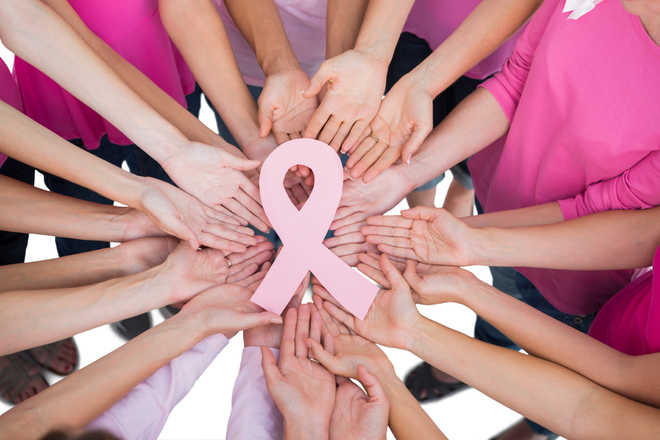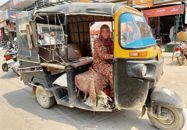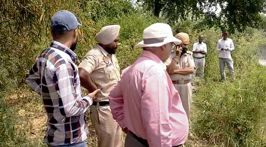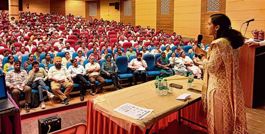
Fight it out: A healthy, stress-free lifestyle, nutritious diet, exercise and abstinence from tobacco and alcohol can check the incidence of breast cancer
Mandeep S Malhotra
Breast cancer has become a major health concern across the globe. An estimated 2 million people develop breast cancer every year. Country specific estimates vary from approximately 230,000 persons in the US to 150,000 in India.
By the next decade, breast cancer will be the cause of maximum deaths among women patients in the world. It affects the Afro-Asian women at a comparatively younger age and more than half of the cases are detected at an advanced stage. The middle age is one of the most important phases in a woman’s life, both as a life partner and a mother. It is alarming that women are now falling prey to this rising menace of breast cancer when they are in the most productive phase of their life cycle.
Risk factors
Breast cancer is broadly of two types. One which is influenced by the lifestyle-related factors and the other caused by faulty genes. The proportion of genetically induced cancers is fortunately low which makes it all the more important to make people aware of the disease and about the preventive measures which can save them from it.
The deciphering of the human DNA and techniques such as the multi-gene sequencing have ushered in a new era in medicine. It is helping experts to discover the defective genes pre-emptively, and thus making timely intervention possible, increasing the possibility of preventing the cancer to take root.Certain hormones such as oestrogen and progesterone play important role in development of cancer. Oestrogen promotes cell growth and progesterone causes cell maturation and stabilisation. It is in the growth phase that cell undergoes malignant transformation, i.e. cancer formation occurs. Therefore, factors such as early menarche (start of menses), late menopause (stopping of menses), alcohol, obesity, lack of exercise and stress, etc. cause increased oestrogen exposure and raise the chances of developing cancer. Smoking is an independent risk factor for developing cancer.
Be vigilant
Timely pregnancy, proper and adequate lactation and a healthy lifestyle induce progesterone and decrease the chances of cancer occurrence. A healthy, stress-free lifestyle, a nutritious diet, exercise or even any low–level daily physical activity and abstinence from tobacco and alcohol are certain measures which can definitely decrease the incidence of breast cancer, as well as other cancers.
Genetic breast cancer
The genetic or hereditary variety of breast cancer is caused by certain genes. Among them the most common genes are BRCA 1 & BRCA 2. These constitute five to 10 per cent of all breast cancers. A woman carrying the BRCA gene has 50 per cent lifetime risk of developing breast cancer and it tends to occur at a younger age.
Who should undergo BRCA testing
This is a very important question and people should be made aware of this important information. The US Preventive Service Task Force suggests the following persons to undergo BRCA testing.
- For women having a strong family history of cancer.
- Cancer at less than 50 years.
- Multiple cancer recurrences or cancer in both the breasts.
- Both breast and ovarian cancers in the same woman.
- Male having breast cancer.
- Ashkenazi Jew ethnicity.
These are few recommendations from the West. The Afro-Asian guidelines are yet to be formulated. The BRCA testing is never to be done as over-the-counter test. It has to be prescribed by a breast oncologist and should only be done after a genetic-counselling session. The direct medical harms of genetic testing are minimal, but knowledge of test results may have harmful effects on a person’s emotions, social relationships, finances, and medical choices. Professional societies also do not recommend children to be tested for BRCA, until they have achieved adulthood and genetic counselling has been done. These genetic tests are now available in India at accredited laboratories which has considerably reduced the test costs.
For those who test positive for BRCA
There are two courses of action which are done to prevent cancer-related death. First is to intensify screening, by starting it at an early age of around 25 to 30 years. Screening includes an MRI, along with an ultrasound and a mammogram. Usually the MRI and mammogram are done every six months alternately. Second is to offer risk reducing (prophylactic) mastectomy with simultaneous or successive removal of ovaries whenever a woman feels comfortable for such removal. It is an important and difficult decision to remove one’s normal breasts, but with advances in reconstruction techniques a woman is able to get her breasts back, thus minimally affecting the routine life. Hollywood actress Angelina Jolie is a living example of it. Therefore, the BRCA testing, if timely done and with appropriate interventions, can reduce the risk of breast cancer by 90 per cent.
Breast cancer can be prevented with certain lifestyle changes in all women and properly informed genetic analysis in susceptible women. Certain methods like screening and in some cases risk reducing surgery are really effective in saving life from this menace.
— The writer is the head of department, head, neck and breast oncoplasty, Fortis Hospital, Vasant Kunj, New Delhi
Process of detection
Screening should be must to detect this cancer at an early stage. This can be really helpful in saving a life in case there is positive report. The American Cancer Society has following screening guidelines
- Yearly mammogram with ultrasound (Sonomammogram) should be done starting at the age 40 and continuing for as long as a woman is in good health.
- Clinical breast exam (CBE); examination by doctor about every three years for women in their twenties and thirties and every year for women who are forty and above.
- Women should know how their breasts normally look and feel and report any changes to a health care provider right away. For that a breast self examination (BSE) should be performed once a month.
- Those who have family history of breast cancer should start having mammograms 10 years before the index case. It means if a woman’s mother or aunt were detected with breast cancer at 45, she should start her yearly mammogram at 35 rather than the usual 40-year baseline.



























